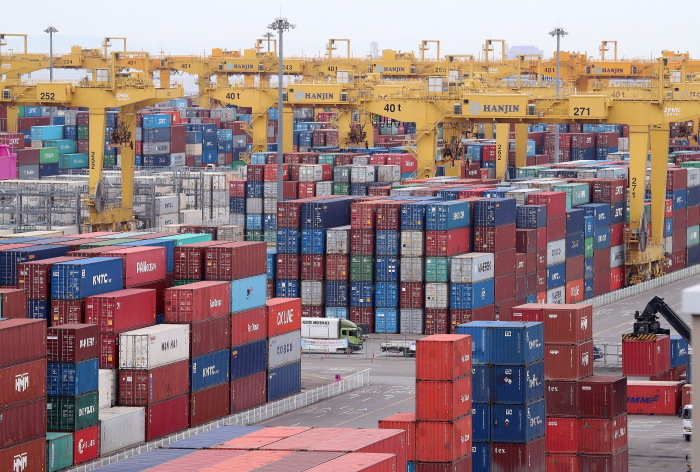
Containers pile up at Incheon New Port, hit by three consecutive days of the truckers' union strike South Korea’s unionized truckers, on day three of a large-scale strike, have moved to disrupt the supply of materials needed to manufacture semiconductor chips. The Korean Confederation of Trade Unions’ truck drivers already started by sealing off supply routes to automobile manufacturers on the second day of the strike. They are members of the union's Cargo Truckers Solidarity division.The Ulsan branch of the labor union advised its members to “focus on [limiting access to and from] LS-Nikko Copper Inc. and Korea Zinc that supply materials to Samsung Electronics Co.,” in an internal memo obtained by the Korea Economic Daily. At the same time, the memo stressed its protest will now adopt a two-pronged approach to target the automobile and semiconductor industries. The labor union is going after South Korea’s bread and butter businesses to maximize the impact of its strike. Logo of LS-Nikko Copper, a joint venture between LS Group and JKJS LS-Nikko Copper and Korea Zinc produce ultra-pure sulfuric acid (PSA) in the city of Ulsan. Semiconductor manufacturers use such acid to clean silicon wafers. Thankfully for the chipmaker, industry insiders largely forecast the strike will not hinder the semiconductor production due to ample stockpiles of materials. “South Korea's chipmakers have worked consistently on diversifying the supply chain following the COVID-19 outbreak and the war on Ukraine,” an industry insider told the Korea Economic Daily. “The trucker strike is highly unlikely to impact the production line.”An industry insider familiar with the development said the unionized workers will also attempt to restrict the flow of supplies to the rest of the semiconductor ecosystem. If the strike continues long term, however, supply disruption and price hikes may be inevitable. While chip costs are determined due to supply and demand, foundry prices reflect the price of raw materials and more. “The rising foundry prices could affect those of household appliances, mobile phones and internet servers,” a high-level executive at a chipmaker said. Members of the Cargo Truckers Solidarity union protest in front of Hyundai Motor Co.'s Ulsan plant Hyundai Motor Co. has suffered limited disruption to the production at its Ulsan plant. Only a quarter of the usual 6,000 vehicles used for transporting parts and steel, as well as for loading activities at ports appears to have been put to use on Thursday. The Korea Auto Industries Cooperation Association (KAICA) released a statement asking the truck drivers to end their strike “for the sake of parts makers of automobiles who are fighting for their survival.”Steelmaking company POSCO was only able to ship half of its regular freight volume of 49,000 tons of steel per day over the past three days. Hyundai Steel Co.’s Pohang plant, for its part, struggled to ship only 9,000 tons of products. An industry insider described the situation as "a de facto paralysis of nationwide logistics." The Ulsan branch members of the truckers' union began their strike on the morning of June 7 This week’s protest is the first large-scale strike for the newly elected President Yoon Suk-yeol. According to the country’s transport ministry, about 7,200 members or roughly 30% of the Cargo Truckers Solidarity union are participating in the strike. The unionized truckers are demanding that Seoul extend the current rules that guarantee their minimum wages, especially given the rising fuel prices. The three-year rule created in 2020 is set to expire this year. By Yong-Hee Kwak, Il-Gue Kimkyh@hankyung.comJee Abbey Lee edited this article.
Most Read